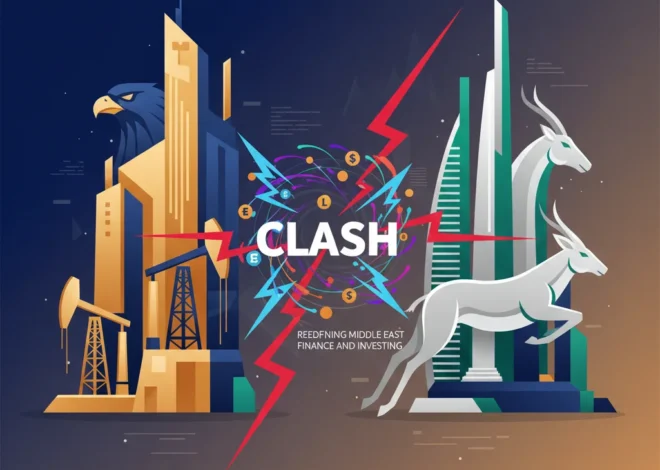
Carrots, Sticks, and Crude Oil: Decoding the High-Stakes Economic Chess Match in Venezuela
In the complex world of international relations, actions often speak louder than words. But what happens when they seem to speak two different languages at the same time? This is the puzzle facing investors, economists, and political analysts as they observe the latest chapter in the US-Venezuela saga. On one hand, the Trump administration has signaled a potential diplomatic opening, with the President himself floating the possibility of talks with Venezuelan President Nicolás Maduro. On the other, the formidable presence of a US Navy aircraft carrier strike group slices through the Caribbean waters, a clear and unmistakable projection of military power.
This dual-track approach—extending an olive branch while brandishing a sword—is more than just political theater. It’s a high-stakes geopolitical gambit with profound implications for the global economy, energy markets, and the future of international investing in volatile regions. For business leaders and finance professionals, understanding the nuances of this “carrot and stick” strategy is crucial for navigating the turbulent waters of geopolitical risk and its impact on the stock market.
The Two-Pronged Strategy: Military Pressure Meets Diplomatic Overture
The recent developments represent a classic, albeit intensified, application of foreign policy pressure. To fully grasp the situation, we must dissect both components of the US strategy.
The “Stick”: A Show of Naval Force
The deployment of the USS Theodore Roosevelt aircraft carrier strike group to the Caribbean is officially part of an enhanced counternarcotics operation. However, its timing and location are widely interpreted as a direct message to the Maduro regime. A carrier strike group is one of the most powerful symbols of military might, capable of projecting force across air, sea, and land. Its presence serves multiple strategic purposes:
- Psychological Pressure: It serves as a constant, visible reminder to Maduro and his inner circle of US military superiority and the potential for escalation.
- Interdiction: It aims to disrupt illicit revenue streams, including alleged drug trafficking, that help keep the cash-strapped regime afloat.
- Deterrence: It sends a strong signal to external actors allied with Maduro, such as Cuba, Russia, and Iran, to temper their support and involvement.
This military posturing tightens the physical blockade around a regime already crippled by economic sanctions, creating a sense of closing walls and limited options.
The “Carrot”: An Unexpected Offer to Talk
Juxtaposed against this backdrop of military muscle-flexing is President Trump’s surprising comment about being open to meeting with Maduro. This statement represents a potential crack in the steadfast US policy of non-recognition. For over a year, Washington has exclusively recognized opposition leader Juan Guaidó as Venezuela’s legitimate interim president. The suggestion of direct talks, even if conditional, opens a new, albeit narrow, diplomatic pathway. This move has been met with a mix of skepticism and cautious optimism, leaving observers to wonder if it’s a genuine policy shift or simply a tactic to sow division within the Maduro government.
The Economic Battlefield: How Sanctions Crippled an Oil Giant
To understand why this geopolitical maneuvering is so critical, we must look at the underlying economic devastation in Venezuela. Once one of Latin America’s wealthiest nations, Venezuela is now a case study in economic collapse, a crisis rooted in mismanagement, corruption, and exacerbated by crippling US sanctions. The nation sits atop the world’s largest proven oil reserves, yet its primary economic engine has all but seized.
US sanctions, primarily administered by the Office of Foreign Assets Control (OFAC), have systematically isolated Venezuela from the global financial system. These measures have targeted:
- The State Oil Company (PDVSA): Sanctions on PDVSA have effectively blocked Venezuela from selling its crude oil to the US, its most important market, and have complicated its ability to conduct transactions in US dollars, the standard currency for oil trading.
- The Government’s Access to Finance: Sanctions prevent the Venezuelan government from accessing US capital markets, making it impossible to restructure its massive defaulted debt or secure new international banking services.
- Key Individuals: Targeted sanctions against high-ranking officials aim to pressure the regime’s leadership by freezing their personal assets abroad.
The impact on Venezuela’s oil production—the lifeblood of its economy—has been catastrophic. Decades of underinvestment and mismanagement were compounded by sanctions, leading to a precipitous decline in output.
Below is a snapshot of the collapse of Venezuelan crude oil production, illustrating the scale of the economic crisis.
| Year | Average Production (mbpd) |
|---|---|
| 2013 | 2.89 (source) |
| 2015 | 2.65 (source) |
| 2017 | 2.03 (source) |
| 2019 | 0.91 (source) |
| 2020 (Est.) | ~0.5-0.7 |
This production collapse has starved the government of the foreign currency needed to import food, medicine, and other essential goods, fueling one of the worst humanitarian crises in the Western Hemisphere.
The Global Chessboard: Russia, China, and Regional Stakes
The US and Venezuela are not acting in a vacuum. A complex web of international interests complicates the crisis.
- Russia: Moscow has been a steadfast ally of Maduro, providing military equipment, economic lifelines, and diplomatic cover at the UN. For Russia, Venezuela is a strategic foothold in America’s backyard and a lever to exert pressure on Washington. Russian oil company Rosneft has been instrumental in helping Venezuela continue to export its oil, circumventing US sanctions.
- China: Beijing’s interest is primarily economic. Over the years, China has extended tens of billions of dollars in loans to Venezuela, to be repaid with oil shipments. While frustrated with the Maduro regime’s incompetence, China’s main priority is ensuring it can eventually recover its massive investment, making it wary of a chaotic collapse that could wipe out its claims.
- Cuba: Havana provides crucial intelligence and security support to the Maduro regime, viewing its survival as essential for its own ideological and economic stability.
The interplay of these global powers means that any resolution in Venezuela will likely require a broader geopolitical consensus, something that remains elusive. The Trillion-Dollar Typo: Why a Small Media Correction Reveals a Huge Risk in Modern Investing
Market Impact: Why Investors Should Be Paying Attention
While Venezuela’s direct impact on the global economy has diminished with its collapse, the situation still holds significant implications for financial markets.
First, there is the matter of oil prices. Although Venezuelan production is a fraction of its former peak, the country still holds the potential to be a major producer. A political transition that reopens Venezuela to international investment and technology could, over several years, bring millions of barrels per day back to the market. Such a development would be a significant bearish factor for long-term oil prices, impacting the profitability and stock market valuations of energy companies worldwide.
Second, the crisis serves as a barometer for geopolitical risk. The potential for escalation, whether through a military incident or a full-blown state collapse, could send shockwaves through Latin American markets and increase risk aversion globally. Investors in emerging market debt and equities are watching closely, as instability in Venezuela could have a contagion effect on neighboring economies like Colombia and Brazil.
Finally, the legal battles over Venezuela’s foreign assets, including the US-based refiner Citgo and billions in gold reserves held in London, have created a complex web of litigation. The outcome of these cases will set important precedents for sovereign immunity and the rights of creditors, with far-reaching consequences for international finance and economics.
The Palazzo Principle: What a Venetian Garden Teaches Us About Modern Finance and Long-Term Value
An Unpredictable Path Forward
The combination of military pressure and diplomatic feelers creates a highly unpredictable environment. The path forward could diverge into several scenarios:
- Protracted Stalemate: The most likely near-term outcome. The Maduro regime remains in power, the economy continues to stagnate, US sanctions remain in place, and the humanitarian crisis deepens.
- Negotiated Transition: The “carrot” approach works. Back-channel talks lead to a power-sharing agreement, new elections are called, and a path is cleared for lifting sanctions and restructuring the economy. This is the best-case scenario but remains a long shot.
- Regime Fracture or Collapse: The “stick” approach works. Intense internal and external pressure causes the regime to splinter from within, leading to Maduro’s ouster. This could be relatively peaceful or could descend into a violent power struggle.
For investors and business leaders, the key is not to bet on a single outcome but to understand the range of possibilities and their potential market impacts. The situation in Venezuela is a stark reminder that in today’s interconnected world, political risk is a fundamental component of economic forecasting and investment strategy.
Ultimately, the dual strategy of military posturing and diplomatic whispers reflects the deep complexity of the Venezuelan crisis. It’s a tacit admission that neither pressure alone has been sufficient to force a resolution. As this high-stakes game of chess unfolds, the world watches, hoping for a peaceful outcome that can restore stability to a suffering nation and clarity to an uncertain market.


